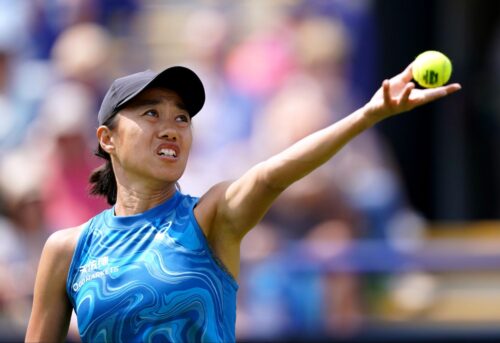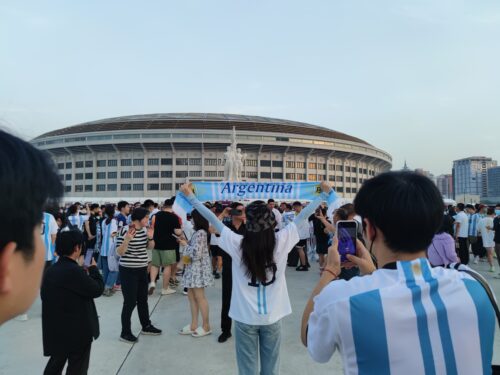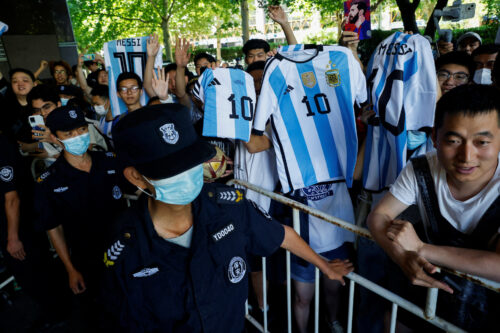Shanghai SIPG clinches club’s first league title — in half-empty stadium, because Chinese football

The China Sports Column is a The China Project weekly feature in which China Sports Insider Mark Dreyer looks at the week that was in the China sports world.
On Wednesday evening, Shanghai SIPG beat Beijing Renhe 2-1 at home to clinch the first Chinese Super League (CSL) title in the club’s short history, having finished runners up in 2015 and 2017. In the process, they ended Guangzhou Evergrande’s remarkable run of seven straight league titles. (Evergrande essentially let the title slip out of its grasp when it lost 5-4 to SIPG on Saturday.)
But — and there’s always a but when it comes to Chinese football — what should have been one of the most celebrated nights in CSL history played out in a stadium in Shanghai that was roughly one-third full. The announced attendance, though still unofficial, was 18,998 despite more than enough interest from fans to fill the capacity of 56,842.
That’s not, as supporters of crosstown rivals Shanghai Shenhua would tell you, because they don’t have enough fans to fill Shanghai Stadium, but because officials in all their infinite wisdom decided to restrict attendance to season-ticket holders only.
These decisions are almost always made under the blanket of “security reasons,” but the logic behind them is almost always flawed.
In Shanghai, police instituted a rule following the stampede on the Bund in 2014 — in which 36 people were killed in a New Year’s celebration — that forced at least 12 percent of seats to remain vacant for CSL games, meaning that tiny contingents of away fans were regularly both outnumbered by police and surrounded by swathes of empty seats.
But there is no such rule for non-CSL games, and large crowds have often turned up to see football at Shanghai Stadium in the past. More than 45,000 people watched Belgium beat New Zealand 1-0 in an Olympic group stage match in 2008, and capacity was reached a week later when Belgium lost to Nigeria in the tournament’s semifinal.
Even after the 2014 ruling, Bayern Munich and Arsenal played out a 1-1 draw in the summer of 2017 before a full house, and the stadium was all but full a couple of years before that when Real Madrid beat AC Milan 10-9 on penalties at the end of another preseason friendly.
Shanghai doesn’t have a monopoly on strange crowd-control measures, though. When the two-day G20 Summit came to Hangzhou two years, the local team was banished to Dalian — 1,200 kilometers away — for an entire month, lest something slightly bad might disturb the world’s top leaders.
With the China International Import Expo — the country’s latest opportunity to take itself too seriously — not ending until Saturday, SIPG fans perhaps should consider themselves lucky that the game even took place in Shanghai at all.
Shortly after last week’s China Sports Column, with its lead story about tennis, was published, something rather unusual happened down in Zhuhai.
Tennis player Wang Qiang 王蔷 had managed to win her second and final round-robin match against American Madison Keys in the WTA Elite Trophy, but, as expected, the result wasn’t enough to send her through to the semifinals. So she packed her bags to go on vacation in Malaysia, checked in for her flight, and prepared for an early departure the following morning.
But then she got a call at 4:30 pm telling her that Keys had withdrawn from the tournament, and that she’d need to be ready to play at 7 pm.
Just hours later, she promptly dispatched former French Open and Wimbledon champion Garbine Muguruza 6-2, 6-0 and found herself in the final.
She then lost in straight sets to Australia’s Ash Barty in the final, but the points she picked up in the rankings, thanks to her unexpected semifinal appearance — and win — meant that by the end of the tournament, she had crept into the world’s Top 20 for the first time.
It capped a dramatic turnaround, with Wang having been ranked at 91 earlier in the year. A remarkable run since July saw her reach four finals — winning two WTA titles — plus a gold medal at the Asian Games, which means she has already qualified for the 2020 Tokyo Olympics.
More significantly, though, she’s the first Chinese player to finish the season ranked in the Top 20 since Li Na 李娜, meaning that yet more comparisons will be made between China’s best ever tennis player and the woman currently looking most likely to emulate her feats.
Li has often spoken about Chinese players maturing comparatively later in their careers, and she herself won her first Grand Slam at 29 and reached her peak ranking of No. 2 three years later.
If Wang, still only 26, follows a similar path, then China may yet be able to celebrate a player at the very highest level and not just the season-ending tournament.
The China Sports Column runs every Friday on The China Project. Follow Mark Dreyer @DreyerChina.







